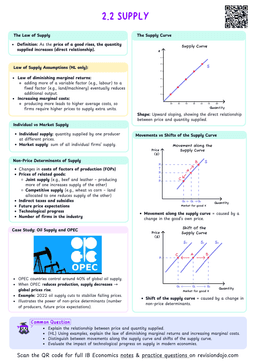Oligopoly
A market structure dominated by a few large firms.
- We have already talked before about the main characteristics of oligopoly which were:
- High barriers to entry
- A few large firms
- Product differentiation
- However there is another important characteristic which we need to mention, which is interdependence.
Interdependence
Interdependence
Refers to the situation where economic entities depend on each other to achieve their goals.
- As opposed to perfect competition and monopolistic competition, where one firms action does not have a big impact on the other, in oligopoly each firms operations can impact the other firms.
- Therefore there should be interdependence in oligopoly, and firms must act together to have higher benefits. Interdependence between oligopoly firms can include:
- Pre designed strategy:
- In an oligopoly, each firm assumes that if a competitor takes a particular action, it must respond in a specific way.
- Therefore considering the action of your competitor in oligopoly markets can be crucial for your growth.
- Conflicting actions: Firms in an oligopoly may take conflicting actions; therefore, they might choose to collude in order to avoid such conflicts.
- Pre designed strategy:
- However, even if firms collude they may still have an incentive to cheat
- For example a few firms agreed on a high price, and if one of them cheats and lowers the price, it will get more consumers and sales hence higher revenue, while other firms will be worse off.`
Collusive Oligopoly
- Collusion: The firms may decide to collude, by e.g fixing a price, and competing in other factors such as quality, to not get into price wars, and earn a more stable revenue.
- One of the most common types of collusion between firms is:
- Cartels: by forming a cartel firms agree to certain points e.g to limit the number of output in the market to limit the competition between them and increase their joint profits.
Note that when firms form cartel and act together, they act as a monopoly.
Non-Collusive Oligopoly
- Non collusive oligopoly refers to the situation where firm in the oligopoly to not collude and don't cooperate in any way to limit competition.
Note however that even if firms do not collude, they still act strategically and take into consideration what impact might their action have on the competition and vice vera.
Game Theory(Payoff Matrix)
- Game theory is a framework designed to analyse the strategic interaction between firm.
- It allows to see how each firm choose its best strategy in a market situation considering what the competitor has done.
- This can be shown through the Payoff Matrix
- In the image we can see a typical payoff matrix, where:
- We have two firms in the market
- Each firm can take one of the two actions:
- Cooperate
- Compete
- If both firms cooperate:


